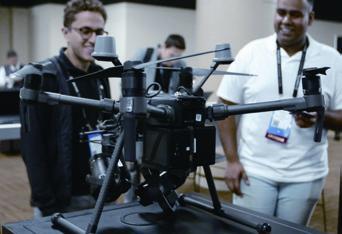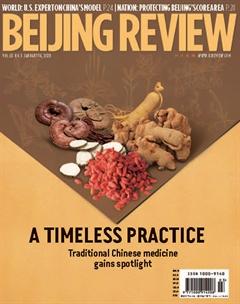‘China Should Believe in Its Model’

According to Peter Walker, author of Powerful, Different, Equal: Overcoming the Misconceptions and Differences Between China and the U.S. and senior partner emeritus at U.S. management consultancy McKinsey & Company, China should follow its own development track and not be distracted by the Wests accusations. This is an edited version of his interview with Beijing Review.
Beijing Review: Whats your take on the huge differences between the political systems of China and the U.S.?
Peter Walker: If you start out with the idea that the role of a society over time is to improve the quality of life, the model in China is what I would call a corporate model. Theres really no difference between how China is organized and managed and the way IBM or other corporate giants are managed.
You have a CEO called the president. You have a board of directors of senior people who provide oversight, direction and counsel to the president. You have meritocracy where people rise up in the Party and government based on their performance. The Central Government has fi ve-year plans to make sure that it executes what it needs in the short term, but also invests in the future. And everyone in senior management is aligned on the same goals and once decisions are made, everyone is committed to execution. There are no fundamental differences in ideology, direction or execution as you see in an adversarial two-party system. Thats an exact replica of the corporate model in the U.S.
Before reform and opening up, China was almost a wasteland with its universities shut for 10 years and no economy to speak of. From that position, how did China get to being a strong country in only 40 years? It had to design a model to get things done. Thats very much like a corporation, which is a very effi cient system.
The government we have in the U.S. was never designed to get things done. It was really designed as a way of ensuring that the governments role would be minimalist to ward off interference in peoples lives and the economy.
So the U.S. has two parties that dont like each other and dont get anything done; three branches, namely executive, judicial and legislative, which have to agree or nothing gets done. We have elections every four years if you dont like what the presidents doing.
Its a model that was designed to defi ne the country based on the performance of its economy. It never set out to use the government to actually build success. The government should not interfere in the peoples ability to take advantage of the countrys rich natural resources and the peoples ingenuity and work ethic. That model has created the worlds largest and most advanced economy for over 150 years. And it worked by that standard.
The Chinese Government is always pragmatic and focuses on what they can actually do and deliver. In the U.S., you have politicians making promises that are appealing to the people but cannot be delivered. In an election-based system, people with very little experience can be elected as president if they are articulate, look well on television and have money.
Look at Donald Trump and Barack Obama. They had little experience relevant to leading a country of the scale and complexity of the U.S. But, they were elected because they had the funding and the media skills to win over enough of the people to prevail.
Its a ridiculous idea for every country, given very different histories and cultures, to have the same model. The U.S. Government was set for two objectives, one was a world class economy, and the second was maximum human rights and personal freedoms. By those measures, the U.S. has been incredibly successful.
The Chinese model was much more about how to focus on raising the quality of life for the maximum number of people in the population. Against that objective, China has been incredibly successful. Why dont we celebrate the fact that were both doing very well as countries and our people are basically happy?
How do you assess Chinas human rights progress?
Many Americans say there are really no human rights in China. Thats totally wrong. China has adopted a relativist approach to human rights because it has always been pragmatic. In other words, the only thing that matters in the Chinese context is the outcome.
Why is that? For a country that has gone through wars and confl icts, social turbulence and starvation in recent history, what are its priorities? They must be food, shelter, safety and health for its people. That doesnt mean that the higher goals of human rights and freedom are not on that list. But if you dont have enough to live on, the idea of being free to do what you want to do is a luxury.
When I talk to young people in China and ask how they feel about freedom, they say they can basically do what they want to. Americans dont understand that because they think that if you cant vote in a Western electoral democracy, you dont really have freedom. But the track record of democracy in the U.S. is uneven with 40 percent of eligible voters not voting, many efforts at the state level to suppress voting especially for minorities, a winner-take-all rather than proportional electoral college system and gerrymandering to marginalize the opposing partys votes.
The U.S. has an absolutist approach to human rights because it has never had any enemy at its borders and has always had plentiful natural resources, water and arable land. It has had it very easy by any global standard. When you have that kind of environment, you can afford to make human rights absolute, as it does in the U.S. Constitution where it says “inalienable rights.”
The U.S. tends to be ideological. Concepts like freedom and democracy are very defi ning. Its not the way the U.S. actually works for everybody, but those taglines are very popular.
In the U.S., the story of one dissident who claims that he or she is not treated fairly can be on the front page of The New York Times. When you talk to Chinese people and ask them how they feel, the response I always get is very predictable.
“How many people are we talking about? Maybe 150 people in a 1.4-billion population. What are they doing? Theyre doing the one thing that the government says you cant do, which is undermining the government that has a pretty good track record of taking care of people over time.”
So when you talk about dissidents in China, people normally say, “Why are we even talking about this!”
Intellectual property (IP) has been a central issue in the China-U.S. trade friction. How do you view the U.S. stance on this?
The U.S. did nothing to protect its own IP for 25 years. When Trump came to Beijing for his fi rst meeting with President Xi Jinping, he started out by saying China has an IP problem. Then he corrected himself saying the U.S. has an “IP theft” problem. Why? Because every country and every company has always looked to take the IP of its competitor.
Asking countries or companies to stop trying to steal IP is like trying to eliminate greed, envy and lust from the human condition—a noble idea not rooted in reality.
America had an entire department in government in the 19th century whose aim was to steal the IP of the Europeans who at the time had the most advanced IP globally. To this day every country, including the U.S. , are doing whatever they can to steal IP.
So the alternative is not convincing people not to take it. Its what you do to protect it. The U.S. now is much more thoughtful about how to protect its IP. But its too late. China was able to access the U.S. IP for de- cades and has caught up to the U.S. in many areas with the notable exceptions of nano chip manufacturing, biotech and aerospace. China has passed the U.S. in renewable energy, high-speed rail and electric cars.

What do you think of the misconceptions about China often played up by Western media?
America is a dualistic society. If people start out with the basis of the dichotomy—good vs. evil, winners vs. losers, its easy to play into that story. Harmony is a much more subtle and complex story than duality and only educated people can understand that concept.
As the U.S. position globally was strengthening in the 19th and 20th centuries, it was able to adopt an interventionist model to promote the spread of “democracy”and “human rights.” While many Americans supported that posture, the strategic consequences have been substantially negative. The U.S. has spent over $10 trillion just on the war on terror since 2001 with an enormous loss of life in Islamic countries and has achieved little. If those funds had been directed to infrastructure, education and healthcare, the U.S. would be in a far stronger position today. China has never adopted an interventionist model and has been able to invest heavily in its future.
China has been incredibly successful for the last 40 years. Keep on doing what youre doing, and whether the U.S. press recognizes what youre accomplishing really doesnt matter.
Look at the support the Chinese Government has from the people and what it has accomplished already in terms of bringing people out of poverty, investing in the future, urbanization, advanced technologies, and the Belt and Road Initiative, which is going to bring trading opportunities outside developed countries. If you execute all of those things well, your prosperity is going to happen.
So at some point, I would say winning over the U.S. press is far less important than delivering on what youve already delivered on and are continuing to deliver on.
I think the most important thing for China is to believe in its model, continue to execute this model and continue to be very responsive to the people. Winning over the support of foreigners is a nice thing to happen but its not critical to Chinas success. You dont need America to like or believe in the Chinese model to be successful in executing it your own way.

